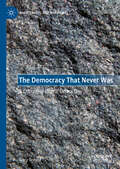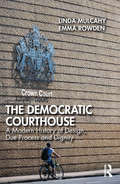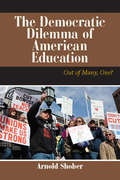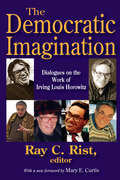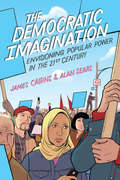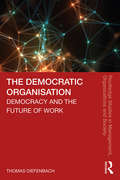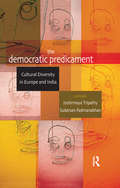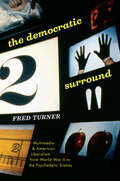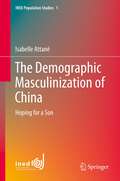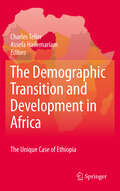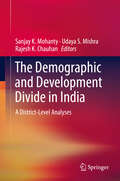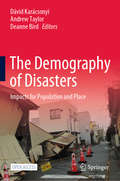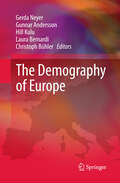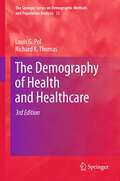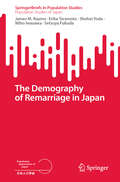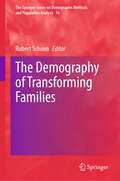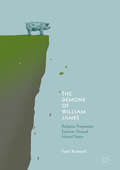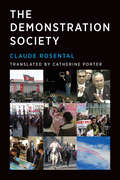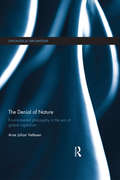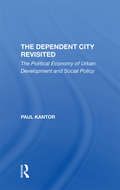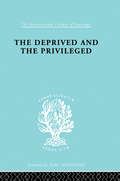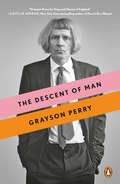- Table View
- List View
The Democracy That Never Was: A Critique of Liberal Democracy (Marx, Engels, and Marxisms)
by Gary TeepleLiberal democracy is usually treated as an independent variable, as possessing the absolutes of democratic rule. Its variable forms, changing principles and practice, and conscious destruction by its own advocates, in particular the United States, however, suggest that it is not what it appears to be. This book argues that it is a dependent variable, the political form required by the changing configurations of national capital and their countervailing forces. The forms of liberal democracy have always shifted in concert with the mode of production as their premise. The absolutes of liberal democracy, the author contends, have never been anything but the abstracted principles of the marketplace. Their nature has now become especially visible for what they have been because the premise as national capital development has changed, leaving liberal democracy as a form without its original content, and its present content out of keeping with a national jurisdiction. As a political form, it persists, but its role has been transformed from the regulation of national capital accumulation to the enforcer of the demands of global configurations of capital. It is a role that its citizens implicitly understand, as revealed in widespread political cynicism, decreasing electoral participation, and declining legitimacy that require ever greater measures of deceit from political leaders and increased means of coercive social control, including militarized police forces and pervasive electronic surveillance. There can be no going back to the stage of national politics because the neoliberal content of liberal democratic policies represents the necessities of global capital. And it is the contradictions of global capital that define the character of early 21st century political conflict.
The Democratic Courthouse: A Modern History of Design, Due Process and Dignity
by Linda Mulcahy Emma RowdenThe Democratic Courthouse examines how changing understandings of the relationship between government and the governed came to be reflected in the buildings designed to house the modern legal system from the 1970s to the present day in England and Wales. The book explores the extent to which egalitarian ideals and the pursuit of new social and economic rights altered existing hierarchies and expectations about how people should interact with each other in the courthouse. Drawing on extensive public and private archives kept by the Ministry of Justice, but also using case studies from other jurisdictions, the book details how civil servants, judges, lawyers, architects, engineers and security experts have talked about courthouses and the people that populate them. In doing so, it uncovers a changing history of ideas about how the competing goals of transparency, majesty, participation, security, fairness and authority have been achieved, and the extent to which aspirations towards equality and participation have been realized in physical form. As this book demonstrates, the power of architecture to frame attitudes and expectations of the justice system is much more than an aesthetic or theoretical nicety. Legal subjects live in a world in which the configuration of space, the cues provided about behaviour by the built form and the way in which justice is symbolised play a crucial, but largely unacknowledged, role in creating meaning and constituting legal identities and rights to participate in the civic sphere. Key to understanding the modern day courthouse, this book will be of interest to legal scholars and students in all fields of law, sociology, political science, psychology and criminology.
The Democratic Dilemma of American Education
by Arnold ShoberThis compelling new book asks: How can American education policy be consistent with democratic ideals? Robust democracy is the combination of participation, self-rule, equality, understanding, and inclusion, but these norms can produce contradictory policy. Local control in education policy can undermine educational equality. Participation in teachers unions can improve working conditions but thwart self-rule by local taxpayers. The Democratic Dilemma of American Education draws on contemporary research in political science and education policy to offer remarkably balanced insights into these challenging issues. Expertly navigating through local, state, and federal layers of education policy, Arnold Shober examines contemporary controversies over education governance, teachers unions and collective bargaining, school funding, school choice, academic accountability, and desegregation. Shober describes the inherent practical dilemmas of current policy and the difficulties policymakers face in overcoming them to produce lasting educational reform in a democratic, federal system of government. Timely, engaging, and accessible, this is the ideal resource for courses in public policy as well as education and politics.
The Democratic Horizon
by Alessandro FerraraAlessandro Ferrara explains what he terms "the democratic horizon" - the idea that democracy is no longer simply one form of government among others, but is instead almost universally regarded as the only legitimate form of government, the horizon to which most of us look. Professor Ferrara reviews the challenges under which democracies must operate, focusing on hyperpluralism, and impresses a new twist onto the framework of political liberalism. He shows that distinguishing real democracies from imitations can be difficult, responding to this predicament by enriching readers' understanding of the spirit of democracy; clearing readers' views of pluralism from residues of ethnocentrism; and conceiving multiple versions of democratic culture, rooted in the diversity of civilizational contexts.
The Democratic Imagination: Dialogues on the Work of Irving Louis Horowitz
by Louis FillerThis festschrift celebrates the accomplishments of renowned social scientist Irving Louis Horowitz as he turned sixty-five. Since Horowitz's views were global and his discourse was never restricted to national boundaries, the volume includes contributions from across the globe. Collectively, the book represents a personal as well as an intellectual statement from the contributors, as each one was a friend and colleague of Horowitz.The life span of Horowitz's ideas stretches across boundaries, many which are focused on in The Democratic Imagination. The twenty-seven essays address Horowitz's work, ideas, and influence. Horowitz was well known for his analysis of the situation in Cuba, disarray in American sociology, the impacts of technology on the publishing industry, and policy-making in the post-Cold-War era. Contributions also take note of Horowitz's involvement in diverse areas: his work with Robert Kennedy; Radio Marti; the United States General Accounting Office, and his efforts on behalf of the freedom of the press.In a final section, Horowitz responds to each of the contributors. This work, celebrating one of the most esteemed social scientists of the twentieth century, acknowledges his manifold contributions to the multiple areas in which he worked.
The Democratic Imagination: Envisioning Popular Power In The Twenty-first Century
by Alan Sears James CairnsDemocracy is very much an open question in the early twenty-first century. While voter participation declines in many traditional democracies, new movements for democracy are emerging around the world. This book brings the question of democracy out of the halls of political power and home to our daily lives, pitting "official democracy" and "democracy from below" against one another in a lively debate.For more information see www.democraticimagination.com.
The Democratic Organisation: Democracy and the Future of Work (Routledge Studies in Management, Organizations and Society)
by Thomas DiefenbachPrevailing models of organisation divide people into owners, managers and employees, forcing especially the latter to obey, to behave, and to function well within a hierarchical and managerial pecking order. However, there is no natural law suggesting the need for such organisations, not in market economies and definitely not in modern democratic societies – and there is no justification for such types of organisation. Arguing that most current organisations are orthodox, hierarchical, anti-democratic, oppressive, unfair, and unjust, this book presents a viable alternative, a better type of organisation – the democratic organisation. Diefenbach develops and provides step by step a systematic, comprehensive, thorough, and detailed general model of the democratic organisation. He describes the democratic organisation’s fundamental principles, values, governance, management, structures, and processes, and the ways it functions and operates both within the organisation and towards others and the environment. Crucially, and most importantly, the democratic organisation provides the institutions and organisational context for individuals to maintain and pursue their fundamental freedoms, inalienable rights, and dignity; to manage organisations in democratic, participative, and cooperative ways; and to conduct business in considerate, balanced, and sustainable ways. This book will be of interest to researchers, academics, practitioners, and students in the fields of management, organisation studies, strategic management, business ethics, entrepreneurship, and family business.
The Democratic Predicament: Cultural Diversity in Europe and India
by Sudarsan Padmanabhan Jyotirmaya TripathyBoth India and Europe have been undergoing a difficult process of negotiating cultural, religious and ethnic diversity within their democratic frameworks. In fact, recent incidents of xenophobic backlash against multiculturalism and minority communities in Europe, as well as myriad movements for constitutional recognition of castes, tribes and languages and the emergence of Islamophobic terror in India, question the conventional idea of democracy as the idyllic preserver of diversity. This volume contests the simplistic connection between democracy and diversity by proposing that democracy, in fact, produces, sediments and reinforces cultural heterogeneity. It argues that in democratic polities, disparate cultural practices are often converted into identity categories, with disturbing implications for national identity, constitutionalism, political governance and citizenship. While mobilizations on the plank of cultural differences are typically viewed as being born in undemocratic spaces with little toleration for diversity, they also find fertile soil in democracy insofar as democracy celebrates diversity and allows cultural dissent to thrive. Such dissent, while essential for democracy, has difficult consequences. Examining the fundamental conflict between constructions of particular cultural identities and mandates of a unifying democratic ethos, the book brings forth the complexities underlying the politics of identity recognition and national integration. In making a radical intervention in the discourse, this volume offers a critique of existing paradigms of multiculturalism. It will interest scholars and students of political science, sociology, and postcolonial and comparative studies.
The Democratic Surround: Multimedia & American Liberalism from World War II to the Psychedelic Sixties
by Fred TurnerWe commonly think of the psychedelic sixties as an explosion of creative energy and freedom that arose in direct revolt against the social restraint and authoritarian hierarchy of the early Cold War years. Yet, as Fred Turner reveals in The Democratic Surround, the decades that brought us the Korean War and communist witch hunts also witnessed an extraordinary turn toward explicitly democratic, open, and inclusive ideas of communication and with them new, flexible models of social order. Surprisingly, he shows that it was this turn that brought us the revolutionary multimedia and wild-eyed individualism of the 1960s counterculture. In this prequel to his celebrated book From Counterculture to Cyberculture, Turner rewrites the history of postwar America, showing how in the 1940s and '50s American liberalism offered a far more radical social vision than we now remember. Turner tracks the influential mid-century entwining of Bauhaus aesthetics with American social science and psychology. From the Museum of Modern Art in New York to the New Bauhaus in Chicago and Black Mountain College in North Carolina, Turner shows how some of the most well-known artists and intellectuals of the forties developed new models of media, new theories of interpersonal and international collaboration, and new visions of an open, tolerant, and democratic self in direct contrast to the repression and conformity associated with the fascist and communist movements. He then shows how their work shaped some of the most significant media events of the Cold War, including Edward Steichen's Family of Man exhibition, the multimedia performances of John Cage, and, ultimately, the psychedelic Be-Ins of the sixties. Turner demonstrates that by the end of the 1950s this vision of the democratic self and the media built to promote it would actually become part of the mainstream, even shaping American propaganda efforts in Europe. Overturning common misconceptions of these transformational years, The Democratic Surround shows just how much the artistic and social radicalism of the sixties owed to the liberal ideals of Cold War America, a democratic vision that still underlies our hopes for digital media today.
The Demographic Masculinization of China: Hoping for a Son
by Isabelle AttanéThis book describes the shortage of girls and women in present day China and focuses on two important features: the sex imbalance in childhood and youth, and the excess mortality of women at various stages of their life. The author analyzes the causes and the processes of a strong preference for sons, which generates discrimination toward females and results in a shortage of girls and women. China's higher proportion of men than women is a population characteristic that is shared by very few countries in the world. This demographic masculinity is unprecedented in the documented history of human populations, both in scale and its lasting impact on the numbers and the structure of the population. Despite the economic boom of recent years, many families in China still consider girls to be less important than boys. Although Chinese women have become largely emancipated since the 1950s, they still do not have the same opportunities for social achievement as men, and Chinese society remains fundamentally rooted in highly gendered social and family roles. As a consequence, Chinese girl babies who have the misfortune to be born instead of a long-awaited son go by various names, such as Pandi (literally "awaiting a son"), Laidi ("a son will follow"), or Yehao ("she'll do too"). The book provides a comprehensive review of the situation of women in China's society and shows that discrimination against girls and women is part of a system of norms and values that traditionally favours males.
The Demographic Transition and Development in Africa
by Charles Teller Assefa Hailemariam"The heated Malthusian-Bosrupian debates still rage over consequences of high population growth, rapid urbanization, dense rural populations and young age structures in the face of drought, poverty, food insecurity, environmental degradation, climate change, instability and the global economic crisis. However, while facile generalizations about the lack of demographic change and lack of progress in meeting the MDGs in sub-Saharan Africa are commonplace, they are often misleading and belie the socio-cultural change that is occurring among a vanguard of more educated youth. Even within Ethiopia, the second largest country at the Crossroads of Africa and the Middle East, different narratives emerge from analysis of longitudinal, micro-level analysis as to how demographic change and responses are occurring, some more rapidly than others. The book compares Ethiopia with other Africa countries, and demonstrates the uniqueness of an African-type demographic transition: a combination of poverty-related negative factors (unemployment, disease, food insecurity) along with positive education, health and higher age-of-marriage trends that are pushing this ruggedly rural and land-locked population to accelerate the demographic transition and stay on track to meet most of the MDGs. This book takes great care with the challenges of inadequate data and weak analytical capacity to research this incipient transition, trying to unravel some of the complexities in this vulnerable Horn of Africa country: A slowly declining population growth rates with rapidly declining child mortality, very high chronic under-nutrition, already low urban fertility but still very high rural fertility; and high population-resource pressure along with rapidly growing small urban places"
The Demographic and Development Divide in India: A District-Level Analyses
by Sanjay K. Mohanty Udaya S. Mishra Rajesh K. ChauhanThis book is the first-ever volume which provides comprehensive information on demographic, health and development at the level of 640 districts in India. Central and state governments, developmental organizations, national and international NGOs and researchers require disaggregated data at the district level for many practical purposes. However, such information is not readily available for use. The editors, with a close-knit group of collaborators, have compiled data from reliable sources for each district of India and present the results in the form of composite indexes. The chapters rank districts within the state and vis-à-vis all districts of India to help readers understand intra-district and inter-district developmental disparities. They present spatial analyses that depict clustering of development. It is a ready reference for planners, researchers and students and provides scientific analyses that depict the clustering of development parameters at the district level. This volume is meant for a wide readership interested in development in India, across population studies, sociology, economics, statistics, to regional development, and from academics, researchers, and planners to policy makers.
The Demography of Disasters: Impacts for Population and Place
by Andrew Taylor Dávid Karácsonyi Deanne BirdThis open access book provides worldwide examples demonstrating the importance of the interplay between demography and disasters in regions and spatially. It marks an advance in practical and theoretical insights for understanding the role of demography in planning for and mitigating impacts from disasters in developed nations. Both slow onset (like the of loss polar ice from climate change) and sudden disasters (such as cyclones and man-made disasters) have the capacity to fundamentally change the profiles of populations at local and regional levels. Impacts vary according to the type, rapidity and magnitude of the disaster, but also according to the pre-existing population profile and its relationships to the economy and society. In all cases, the key to understanding impacts and avoiding them in the future is to understand the relationships between disasters and population change. In most chapters in this book we compare and contrast studies from at least two cases and summarize their practical and theoretical lessons.
The Demography of Europe
by Gunnar Andersson Gerda Neyer Laura Bernardi Christoph Bühler Hill KuluOver the past decades Europe has witnessed fundamental changes of its population dynamics and population structure. Fertility has fallen below replacement level in almost all European countries, while childbearing behavior and family formation have become more diverse. Life expectancy has increased in Western Europe for both females and males, but has been declining for men in some Eastern European countries. Immigration from non-European countries has increased substantially, as has mobility within Europe. These changes pose major challenges to population studies, as conventional theoretical assumptions regarding demographic behavior and demographic development seem unfit to provide convincing explanations of the recent demographic changes. This book, derived from the symposium on "The Demography of Europe" held at the Max Planck Institute for Demographic Research in Rostock, Germany in November 2007 in honor of Professor Jan M. Hoem, brings together leading population researchers in the area of fertility, family, migration, life-expectancy, and mortality. The contributions present key issues of the new demography of Europe and discuss key research advances to understand the continent's demographic development at the turn of the 21st century.
The Demography of Health and Healthcare
by Richard K. Thomas Louis G. PolIn this 3rd edition of the definitive work on health demography, Pol and Thomas offer an updated view of the field and a current perspective on the applications of health demography to contemporary issues. The significance of health demography within the field of population studies has continued to increase and this work provides background on the healthcare arena and systematically presents the various aspects of demography as they relate to healthcare. This addition has been streamlined to focus on the important aspects of health demography and enhanced through the addition of charts, maps and other graphics. All statistics and tables have been updated and the most current references are included. A separate chapter on morbidity has been included and the final chapter focuses on the public policy interface with health demography. Case studies and sidebars are included throughout the book to illustrate the applications of demography within the healthcare arena. Recent developments in U.S. healthcare are highlighted to give the text a very contemporary presence.
The Demography of Remarriage in Japan (SpringerBriefs in Population Studies)
by James M. Raymo Miho Iwasawa Erika Teramoto Shohei Yoda Setsuya FukudaThis book provides the first comprehensive demographic overview of remarriage in Japan. Despite the fact that nearly one in five marriages in Japan now involves at least one formerly married spouse, very little is known about the nature of remarriages and how they differ from first marriages. One important focus of this book is to examine fertility intentions and outcomes in remarriages and to compare them with marriages in which both partners are in their first marriage. It is well known that low rates of first marriage contribute to Japan’s very low total fertility rate (TFR), but there is currently no theoretical or empirical basis for understanding how levels and patterns of remarriage are related to the TFR. To understand trends and patterns of remarriage in Japan, the book begins with an overview of the voluminous research literature on remarriage in the USA and other Western countries. This overview consists of a summary of trends and theoretical frameworks for understanding remarriage and is followed by a summary of existing research on correlates of remarriage and outcomes associated with higher-order marriages. Of particular importance is the attention paid to stepfamily fertility and the extent to which remarriage is associated with overall levels of fertility. An important contribution of this book is its presentation of basic descriptive information about levels and correlates of remarriage in Japan. These descriptive analyses are based on published data in the vital statistics reports and individual-level data from the National Fertility Surveys conducted by the National Institute of Population and Social Security Research and the National Survey of Households with Children conducted by the Japan Institute for Labour Policy and Training.
The Demography of Transforming Families (The Springer Series on Demographic Methods and Population Analysis #56)
by Robert SchoenThis book provides an up-to-date survey on the nature, causes, and patterns of family change. The traditional nuclear family has been replaced by a multiplicity of other forms, as widespread cohabitation, high levels of divorce and union dissolution, rising childlessness, and far below replacement fertility have emerged to an extent never before seen. Theoretical perspectives on this “Second Demographic Transition” are presented, highlighting the dramatic changes in gender roles. New methodological strategies for assessing family dynamics are presented, from multistate models of marriage and divorce combined with fertility to improved techniques for combining census and survey data on the family to a new approach for disentangling age, period, and cohort effects. While the volume emphasizes Western nations, insightful case studies range from analyzing family complexity in cohorts of parents and children in the UK to the impact of interpartner violence on family formation, to the emergence of a “gender war” in South Korea. By providing new insights into where we are today and how we got here, the book will be of value to all those interested in the contemporary family."Delayed Fertility as a Driver of Fertility Decline?" available open access under a Creative Commons Attribution 4.0 International License via link.springer.com.
The Demons of William James: Religious Pragmatism Explores Unusual Mental States
by Tadd RuetenikThis book is a psychological exploration of unusual minds, a religious exploration of demonological myth, and a philosophical exploration of the reaches of pragmatism. It uses topics such as hypnotism, mediumship, and mass possession to argue for a comprehensive understanding of the demonic that acknowledges not only the creativity which it encourages, but also the danger it can bring. Professor Ruetenik uses James’ religious pragmatism to evaluate the relevance of psychical research, and to explain common beliefs regarding demons, spirits, and other controlling personalities. The conclusion of this interdisciplinary research is as alarming as it is fascinating: When exploring the demons of William James, we discover that ordinary personality cannot be clearly separated from what we consider the demonic.
The Demonstration Society (Infrastructures)
by Claude RosentalToday, as in the past, public demonstrations are not only tools to prove, persuade, and promote, but also fundamental forms of social interaction and exchange.YouTube demos of makeup products by famous influencers, demonstrations of strength during street protests, demonstrations of military might in North Korea: public demonstrations are omnipresent in social life. Yet they are often perceived as isolated events, unworthy of systematic examination. In The Demonstration Society, Claude Rosental explores the underlying dynamics of what he calls a &“demonstration society.&” He shows how, both in today&’s world and historically, public demonstrations constitute not only tools to prove, persuade, and promote, but fundamental forms of interaction and exchange, and, in some cases, attempts to lead the world. Rosental compares demos with other forms of public demonstrations, drawing out both their peculiarities and common features. He analyzes the processes through which demonstrations are conceived and carried out, as well as the skills of their producers. He also compares contemporary demos with historical demonstrations including theaters of machines in the Renaissance, public demonstrations of natural philosophy in the seventeenth century, and demonstrations of the magic lantern in the nineteenth century. Above and beyond the entertainment they sometimes provide, demonstrations are experienced as intense moments that broadly involve alliances, material and symbolic goods, and, more generally, the future of individuals and collectives. Rosental elucidates the many ways in which we live today, as in the past, in a society of demonstration.
The Demotivated Employee: Helping Leaders Solve The Motivation Crisis That Is Plaguing Business
by Cathy Bush Tara PetersDo you ever wonder why employees are not as motivated and productive as you would like for them to be? Do you find yourself thinking that some employees are just “lazy slackers”? You may be surprised to learn that there are other explanations for employee demotivation that you may not be thinking about when you are leading people. Authors Tara Peters and Cathy Bush have worked with thousands of leaders who are shocked to learn that managers and leaders play a significant role in causing employees to lose motivation. Without even realizing it, we take all sorts of actions during the process of leading people and organizations, and many of these actions actually deflate the motivation that people bring with them to work. In The Demotivated Employee, readers will learn what leadership behaviors they are engaging in that might demotivate their employees; how to better communicate with employees so this doesn’t happen; and how to work within the constraints of organizational culture to help employees thrive.
The Denial of Nature: Environmental philosophy in the era of global capitalism
by Arne Johan VetlesenA study of the increasingly precarious relationship between humans and nature, this book seeks to go beyond work already contributed to the environmental movement. It does so by highlighting the importance of experiencing, rather than merely theorizing nature, while realizing that such experience is becoming increasingly rare, thus reinforcing the estrangement from nature that is a source of its ongoing human-caused destruction. In his original approach to environmental philosophy, the author argues for the reinstatement of nature's value outside of its exploitative usefulness for human ends. Such a perspective emphasizes the extent to which the environmental problem is a concrete reality requiring urgent action, based on a multi-sensuous appreciation of humans' dependence on nonhuman lifeforms. Designed as an accompaniment to undergraduate and postgraduate research, The Denial of Nature draws on empirically informed literature from the social sciences to examine what life is really like for humans and nature in the era of global capitalism. The book contends that capitalist society exploits nature - both in the form of human capital and natural capital - more relentlessly than any other and offers an environmental philosophy which actively opposes current developments. Through discussions of the work of Teresa Brennan, Theodor Adorno, Martin Heidegger and Hans Jonas, and through a radical critique of the nature deficit in Jürgen Habermas' theory of capitalist modernity, The Denial of Nature relies on insights from Critical Realism to bring together several, seldom-linked philosophies and suggest a new approach to the heavily-discussed question of environmental ethics. Arne Johan Vetlesen is Professor of Philosophy at the University of Oslo, Norway and the author of twenty books among them Perception, Empathy and Judgment: An Inquiry into the Preconditions of Moral Performance (1994), Closenes: An Ethics (with H. Jodalen; 1997), Evil and Human Agency (2005) and A Philosophy of Pain (2010). .
The Dependency Agenda
by Kevin D. WilliamsonEach year, the United States spends $65,000 per poor family to "fight poverty" - in a country in which the average family income is just under $50,000. Meanwhile, most of that money goes to middle-class and upper-middle-class families, and the current U.S. poverty rate is higher than it was before the government began spending trillions of dollars on anti-poverty programs.In this eye-opening Broadside, Kevin D. Williamson uncovers the hidden politics of the welfare state and documents the historical evidence that proves Lyndon B. Johnson's "Great Society" was designed to do one thing: maximize the number of Americans dependent upon the government. The welfare state was never meant to eliminate privation; it was created to keep Democrats in power.
The Dependent City Revisited: The Political Economy Of Urban Development And Social Policy
by Paul KantorHere is a book that makes sense of the L.A. riots, homelessness, tax giveaways, and the other big urban issues that are back in the national spotlight. In this streamlined and updated new edition of his classic book, The Dependent City, Paul Kantor now focuses on economic development and social welfare policies to reveal the key dilemmas of American urban politics. Returning to a political economy theme, Kantor explores how city governments have struggled to escape and accommodate the reality of their economic dependency in the policies that they've pursued. Revisiting cities across the nation, Kantor finds not only that they have become more dependent but also that the character of this dependency has changed and deepened. Exploring local regimes in the Frostbelt and Sunbelt and in suburbia, he finds that they frequently act more like captives of big business rather than as representatives of citizens. Local attempts to promote social justice increasingly run up against a wall of economic dependency created by federal policies and business power. This book signals how American cities can find ways of overcoming this dependency by working together with states and the federal government to promote healthy, democratic urban politics. The Dependent City Revisited is an accessible, provocative supplement for a wide variety of courses in urban studies and political economy as well as stimulating reading for anyone who is interested in understanding America's urban mosaic.
The Deprived and The Privileged: Personality Development in English Society (International Library of Sociology)
by B.M. SpinleyFirst published in 1998. Routledge is an imprint of Taylor & Francis, an informa company.
The Descent of Man
by Grayson PerryWhat does it mean to be male in the 21st Century? Award-winning artist Grayson Perry explores what masculinity is: from sex to power, from fashion to career prospects, and what it could become—with illustrations throughout.In this witty and necessary new book, artist Grayson Perry trains his keen eye on the world of men to ask, what sort of man would make the world a better place? What would happen if we rethought the macho, outdated version of manhood, and embraced a different ideal? In the current atmosphere of bullying, intolerance and misogyny, demonstrated in the recent Trump versus Clinton presidential campaign, The Descent of Man is a timely and essential addition to current conversations around gender. Apart from gaining vast new wardrobe options, the real benefit might be that a newly fitted masculinity will allow men to have better relationships—and that’s happiness, right? Grayson Perry admits he’s not immune from the stereotypes himself—yet his thoughts on everything from power to physical appearance, from emotions to a brand new Manifesto for Men, are shot through with honesty, tenderness, and the belief that, for everyone to benefit, updating masculinity has to be something men decide to do themselves. They have nothing to lose but their hang-ups.
